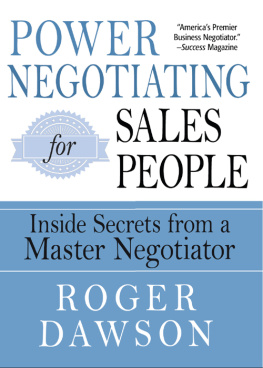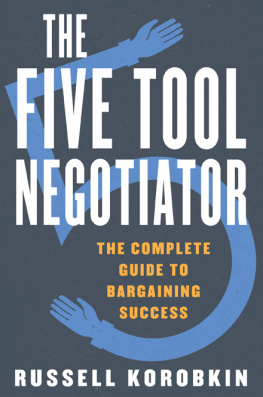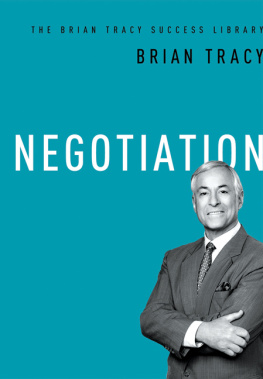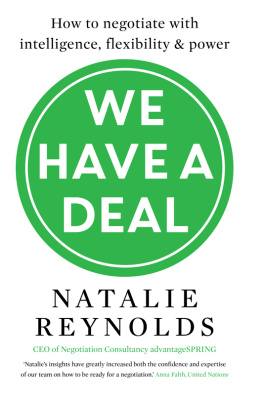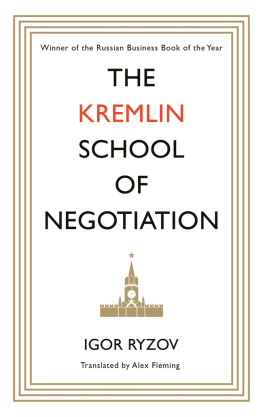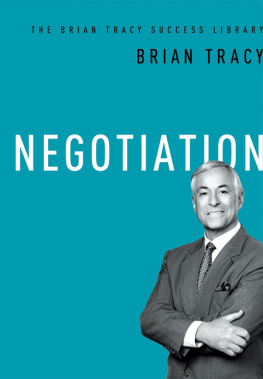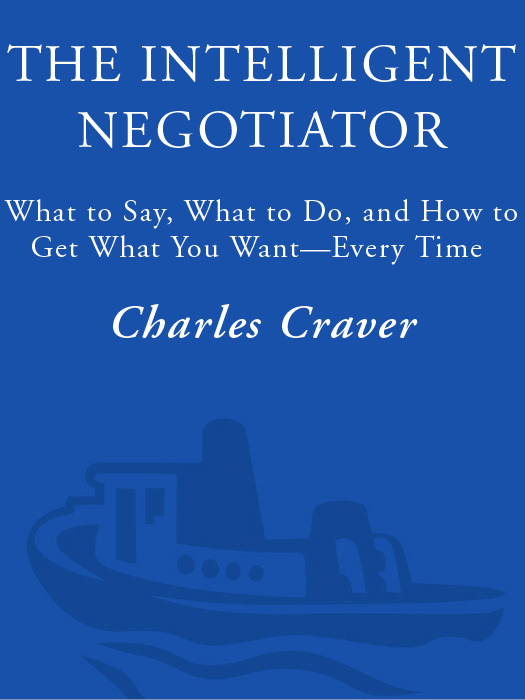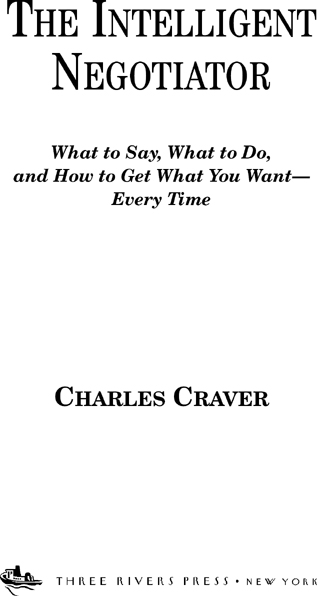Charles Craver is that welcome raritya leading academic who possesses a sure grasp of the practicalities of everyday negotiating. And unlike many of his peers, Craver is not embarrassed about making a good deal for his side of the table.
James C. Freund, author of Smart Negotiating
An excellent guide to obtaining your negotiating goals. For those wanting to achieve better results at the bargaining table, this is an invaluable resource.
Andrew M. Kramer, partner,
Jones Day Reavis & Pogue
I rely often on the powerful insights of Professor Craver. He fully appreciates the subtleties of the process of negotiation. I hope my adversaries dont read this book.
Charles Craver goes beyond the traditional approaches to bargaining. Read this book and you will dramatically enhance your negotiating skills.
Ambassador John W. McDonald, chairman,
Institute for Multi-Track Diplomacy
Charles Craver imparted invaluable lessons in the art of negotiation in the course I took from him thirty years ago. The Intelligent Negotiator is a must-read for anyone looking to maximize his success in competitive business. It brims with compelling strategies for achieving superior results.
C ONTENTS
PART I:
PART II:
PART III:
A CKNOWLEDGMENTS
I t is impossible to prepare a book on negotiating without relying upon the theories and concepts articulated by experts from diverse fields of study, including communication, psychology, sociology, law, and business. Those scholars have enhanced my understanding of the negotiation process. I also thank the hundreds of students who have taken my Legal Negotiating course and the thousands of lawyers and businesspeople who have participated in my Effective Legal Negotiation and Settlement programs, providing me with new insights and interesting bargaining stories.
I am especially indebted to Beth Lieberman, who took my original manuscript and patiently and professionally turned it into a finished work. Her extraordinary editorial assistance significantly enhanced the final product. Thanks to Ruth Younger for her extraordinary copyediting talents. My project editor, Michelle McCormack, further enhanced the final work. I must also thank David Richardson of Prima Publishing for giving me the opportunity to bring my ideas and teachings to a broader readership, and for his deft guidance throughout the publishing process. My sincere gratitude goes to my agents, Janet Rosen and Sheree Bykofsky, who had confidence in the book I sought to produce.
I must finally thank Katey, my loving spouse and negotiating partner for the past thirty-five years. She, more than anyone, has taught me more about the mutual benefits to be achieved through effective negotiating.
I NTRODUCTION
I ntelligent Negotiators are prepared, confident, and supremely effective. They know what to expect of each unfolding stage of a bargaining encounter. They have defined their own goals and determined how they can best attain them; they have also discerned the goals of their counterparts. Intelligent Negotiators vast knowledge of bargaining techniques allows them to create powerful negotiating strategies that advance their sides interests and at the same time enhance the final outcome for everyone involved.
The goals of the Intelligent Negotiator are often work-related. Whos going to cover the client meeting in Omaha? Should we charge our usual 10 percent commission on the contract for a particular client, or reduce it to 7 or 8 percent to ensure future client loyalty? What quality guarantees should we get from the raw material supplier were thinking of using? Should I insist on being given the executive title of the person Im replacing, or wait until Ive demonstrated my capabilities in the new position?
At other times, the subject of negotiation is personal or professional. How can I land the perfect job that just became available? How can I get the starting salary I feel I deserve? How can I get the salary increase I think is appropriate? Can I get my superior to change negative comments in my last performance evaluation? How can I interact more effectively with my coworkers and subordinates?
Still other issues relate to family and quality of life. Where will our family go for summer vacation? Can we get better terms on the second mortgage we are taking out to pay for our childs college education? How can we minimize the cost of car or appliance repairs? Negotiating is the key to finding the best solution in each of the above situations.
N EGOTIATING O UR W AY T HROUGH L IFE
Although most of us rarely stop to think about it, we negotiate our way through life. Every day we negotiate with family, friends, members of our communities, business associates, salespeople, and complete strangers. Still, many of us are uncomfortable with the idea of bargaining. We dread the psychological battle of wills, the exploitive rituals, and the deception it normally entails. We tell ourselves that bargaining is not a normal part of life, even believing that most things in life are not negotiable. We go to stores, examine the price tags on desired commodities, and decide whether to purchase those items at the stated prices. We rarely seek more beneficial terms, fearing we will embarrass ourselves by even asking. If we only realized how many salespeople in even staid retail establishments are willing to negotiate lower prices or other customer-beneficial terms when asked, we could benefit dramatically.
Businesspeople often fail to appreciate the degree to which they must negotiate with superiors, subordinates, and others in the employment setting. They cavalierly arrange employment relationships, supplier contracts, and customer deals without recognizing the bargaining aspectsand potential enhanced rewardsof these critical encounters.
Some less-proficient negotiators excuse their lack of interest in the bargaining process by maintaining that objective market-driven forces determine the price or value of most commercialand many non-commercialitems. They think they have no control over externally regulated factors. This assumption completely ignores the personaland necessarily subjectivefactors that affect bargaining encounters. A prospective car or home buyer who wants a particular car model or a specific house that is in demand is likely to pay a premium. On the other hand, someone who is willing to purchase a different car or house can offer a lower bid that may result in saving literally thousands of dollars. People with new job offers who ask for higher starting salaries get paid substantially more than those who merely accept the initial offers. Even department store shoppers who negotiate prices may save 10 to 20 percent over shoppers who pay the stated prices for the items they purchase. Buyers who politely ask sales clerks Is this the best price you can give me? may receive last weeks sales price or be offered a discount if they purchase two of the items they are considering.
Skilled negotiators realize that various factorsbeyond basic seller costplay a significant role in bargaining encounters. These diverse factors determine the settlement range (see ) defines the settlement range. Every point within that range is acceptable to both of the negotiating parties.


